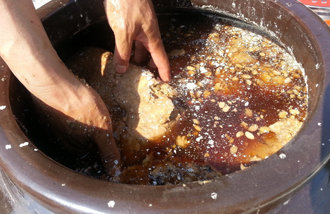Sportsmanship of clapping to Korean school song
Sportsmanship of clapping to Korean school song
Posted August. 26, 2024 07:42,
Updated August. 26, 2024 07:42
The baseball team members of Kyoto International Junior and Senior High School, a school for Korean-Japanese students, hugged each other and celebrated after they won the 106th Japanese High School Baseball Championship. The baseball players lined up along home plate and sang their school song in Korean, with which many South Koreans are familiar. The song starts with lyrics that say, “The land of Yamato across the East Sea was the place dreamt by our ancestors.” Along with the song, the sound of clapping to the rhythm of the Korean school song was heard from those cheering for Kanto Daiichi High School, the opposition team, near first base. Why did the cheering squad of the opposition team clap to the Korean song of Kyoto International Junior and Senior High School?
At the Hanshin Koshien Stadium on August 19, Taisha High School representing Shimane and Kamimura Gakuen High School representing Kagoshima competed against each other during the octofinals of the championship. Taisha High School garnered the most attention this year until Kyoto International Junior and Senior High School won the championship. The team defeated prominent high school baseball teams, including Waseda Jitsugyo High School that produced Sadaharu Oh nicknamed “the home run king of the century,” and advanced to the quarterfinals.
Thousands of people, including current students, alumni, and residents, gathered at the Hanshin Koshien Stadium to cheer Taisha High School, which reached the quarterfinals for the first time in 93 years. The mega-scale cheering for the school that filled the stadium was the best sight of the stadium this year.
However, the school lost the game 2-8. A surprising thing happened as the school song of the opposition team played after the game. Those who cheered Taisha High School clapped to the rhythm of the song. “I felt a sense of responsibility that we should win the championship for Taisha High School when I heard clapping,” said the opposition team manager.
Kamimura Gakuen High School was defeated by Kanto Daichi High School with a score of 1-2 in the semifinal match on Wednesday. Then, the sound of clapping came from those cheering Kamimura Gakuen High School to the school song of the winner. The sound in rhythm with the song, including those with thundersticks, echoed in the stadium. Two days later, Kyoto International Junior and Senior High School received the sound of clapping from the cheering crowd of Kanto Daichi High School as the final winner of the championships. After finishing the school song, the baseball players of Kyoto International Junior and Senior High School ran to the cheering audience near third base and expressed their gratitude. Then, they immediately turned to those cheering the opposition team near first base and vowed deeply with their hats off.
Whenever there are issues between South Korea and Japan, the Internet is filled with slurs and hateful comments. Regarding the Korean school song of Kyoto International Junior and Senior High School, the Japanese said such a school should be removed, while South Koreans criticized severe anti-Korea sentiment on the Internet. Sports teams tend to feel timid in situations like this. Some members of Kyoto International Junior and Senior High School also suggested changing its song. In mid-August, South Koreans argued whether Japanese players should be allowed in the stadium for professional baseball games held on National Liberation Day of Korea.
Such slurs and disputes took place outside the baseball stadium. Inside, there was only sportsmanship that respects the blood and sweat of athletes tanned under the scorching sun, fair play, and both the winning team and its opposition. The clapping for the opposition team’s school song, which began in the octofinals, relayed all the way up to the final champion. It is a world unknown to keyboard warriors who are busy typing to attack others.
“I thought we must win for those cheering us rather than giving into people criticizing the song,” said Fujimoto Haruki, the captain of Kyoto International Junior and Senior High School, when asked about the controversy surrounding the school song after the game. I heard in person the sound of cheering from the cheering section of the opposition team after the match. It was the sound of touching sportsmanship.
Headline News
- Security strengthened at residences of U.S. presidential candidates
- Late-night announcement issued on Pres. Yoon’s public address
- Green Belt in Seoul to be released in 12 years
- Meta fined 20 billion won for illegally collecting sensitive information
- Culture Ministry calls for severe disciplinary action against KFA chair







